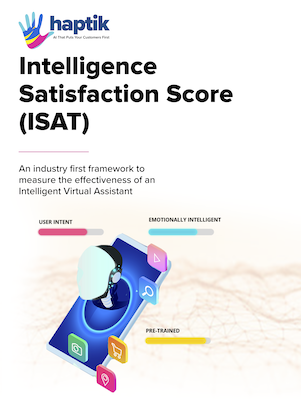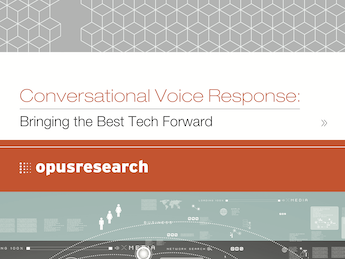 In the past five years, Opus Research has witnessed global growth in intelligent assistants, otherwise known as chatbots or automated virtual agents, across multiple vertical industries, including banking and financial services, telecommunications, insurance, e-commerce and more.
In the past five years, Opus Research has witnessed global growth in intelligent assistants, otherwise known as chatbots or automated virtual agents, across multiple vertical industries, including banking and financial services, telecommunications, insurance, e-commerce and more.
As business units continue to recognize opportunities to bring in virtual agents to help accomplish tasks in marketing, sales, and customer support, many businesses struggle with identifying the appropriate metrics to employ to measure success in these deployments.
One solution provider, Haptik, has developed a new framework that measures the effectiveness of successful intelligent virtual assistant conversations. Looking beyond metrics that focus exclusively on customer-provided feedback, such as Customer Satisfaction (CSAT) and Net Promoter Score (NPS), Haptik’s Intelligence Satisfaction Score (ISAT) delves into the core performance indicator (“intelligence”) to assess and calculate the performance of IAs based on conversational outcomes.
The free report (offer to download below) includes definitions for positive, negative, and neutral conversational outcomes and how to validate the Intelligence Satisfaction model. Haptik also offers a case study of a global insurance group who leveraged the framework to improve their performance score from 36% to 76%, six months later.
This method of measurement is important because it starts at the conversation level with the goal of improving intelligent assistant answers consistently and at-scale. Possible future enhancements include industry-wide benchmarks, best practices, and how AI and machine learning can be leveraged to automate conversational design and performance improvements.
Please fill out the form below to receive a free copy of ISAT report. For more information, please contact: Peter Headrick, pheadrick@cgy.bcc.myftpupload.com, +1-415-904-7666
Categories: Conversational Intelligence, White Papers, Intelligent Assistants, Articles, Mobile + Location

 Zoho Proves That “Business Intelligence” Is Not an Oxymoron
Zoho Proves That “Business Intelligence” Is Not an Oxymoron  Opus Research Report: “Enhancing Artificial Intelligence with Human Insight”
Opus Research Report: “Enhancing Artificial Intelligence with Human Insight”  Opus Research “Vendors That Matter” Series: Marchex
Opus Research “Vendors That Matter” Series: Marchex  Opus Research Report: “Conversational Voice Response: Bringing the Best Tech Forward”
Opus Research Report: “Conversational Voice Response: Bringing the Best Tech Forward”